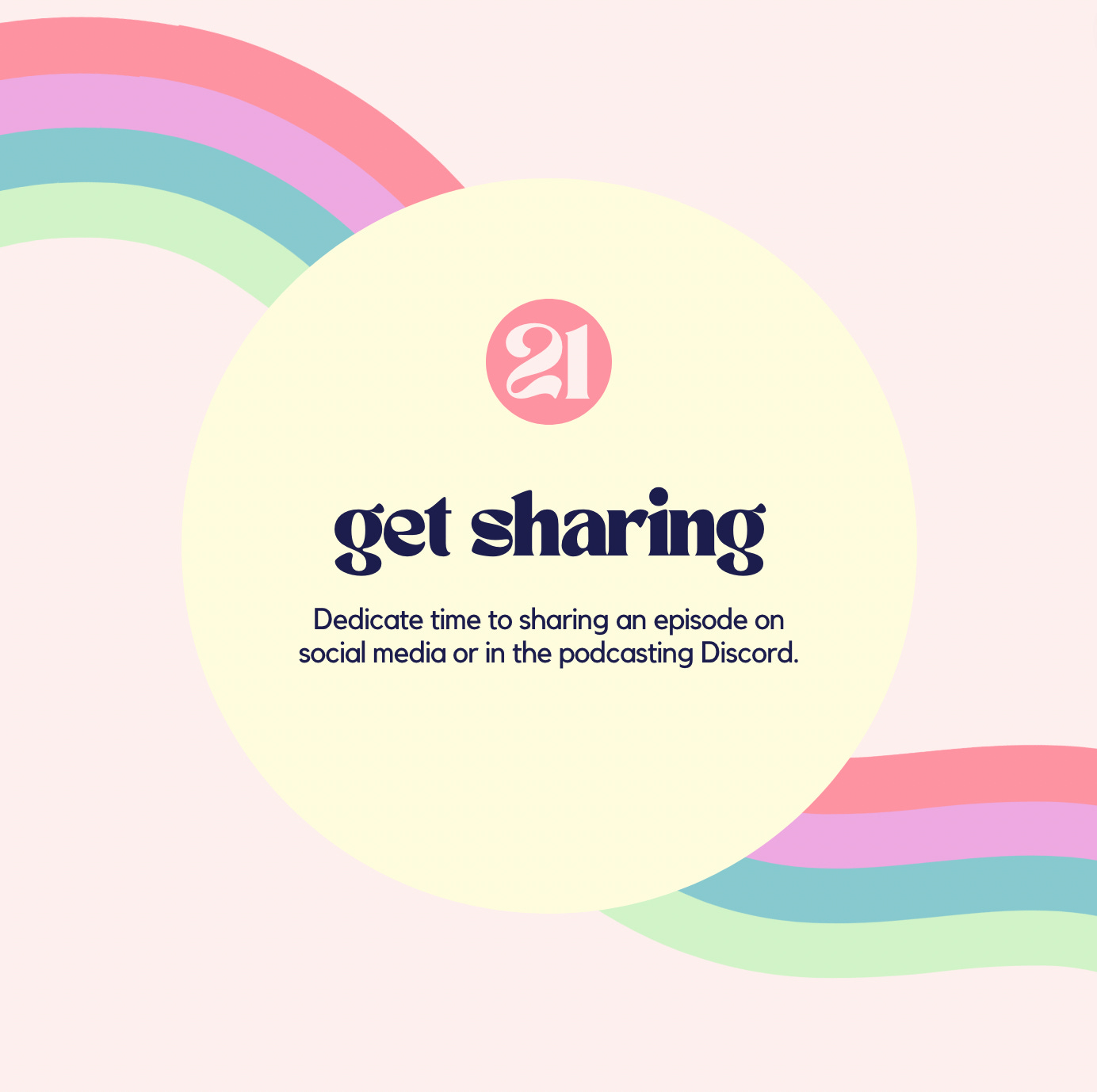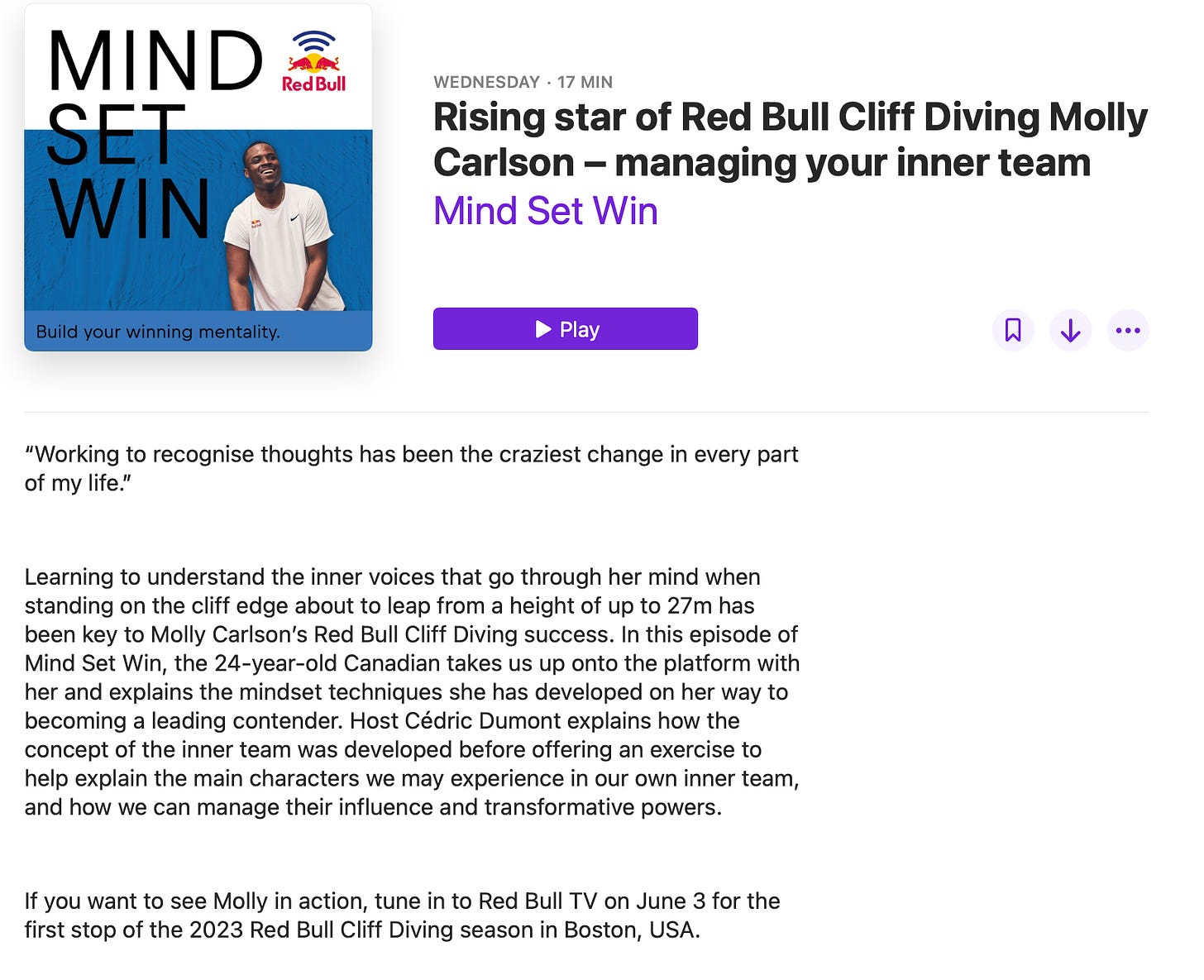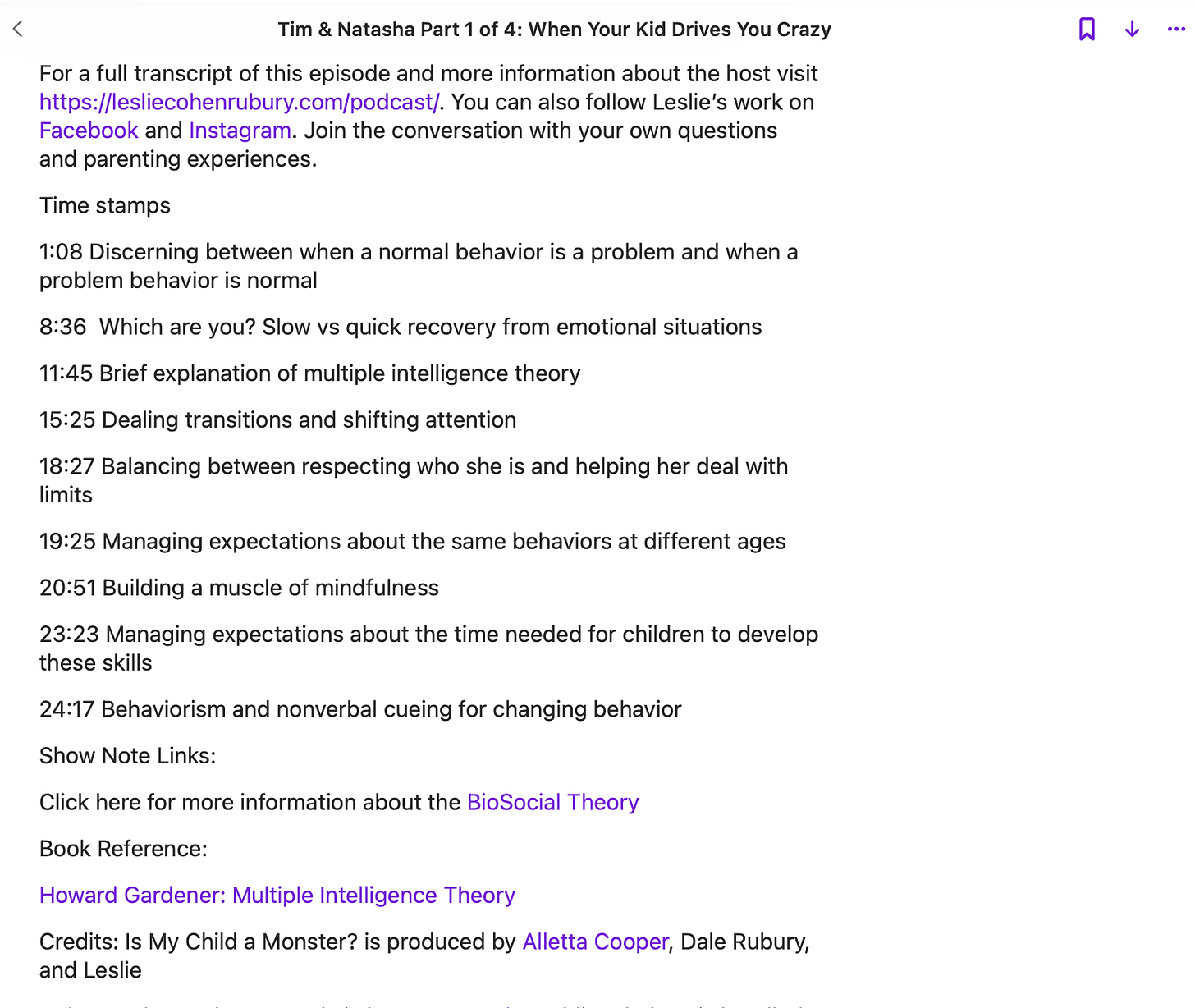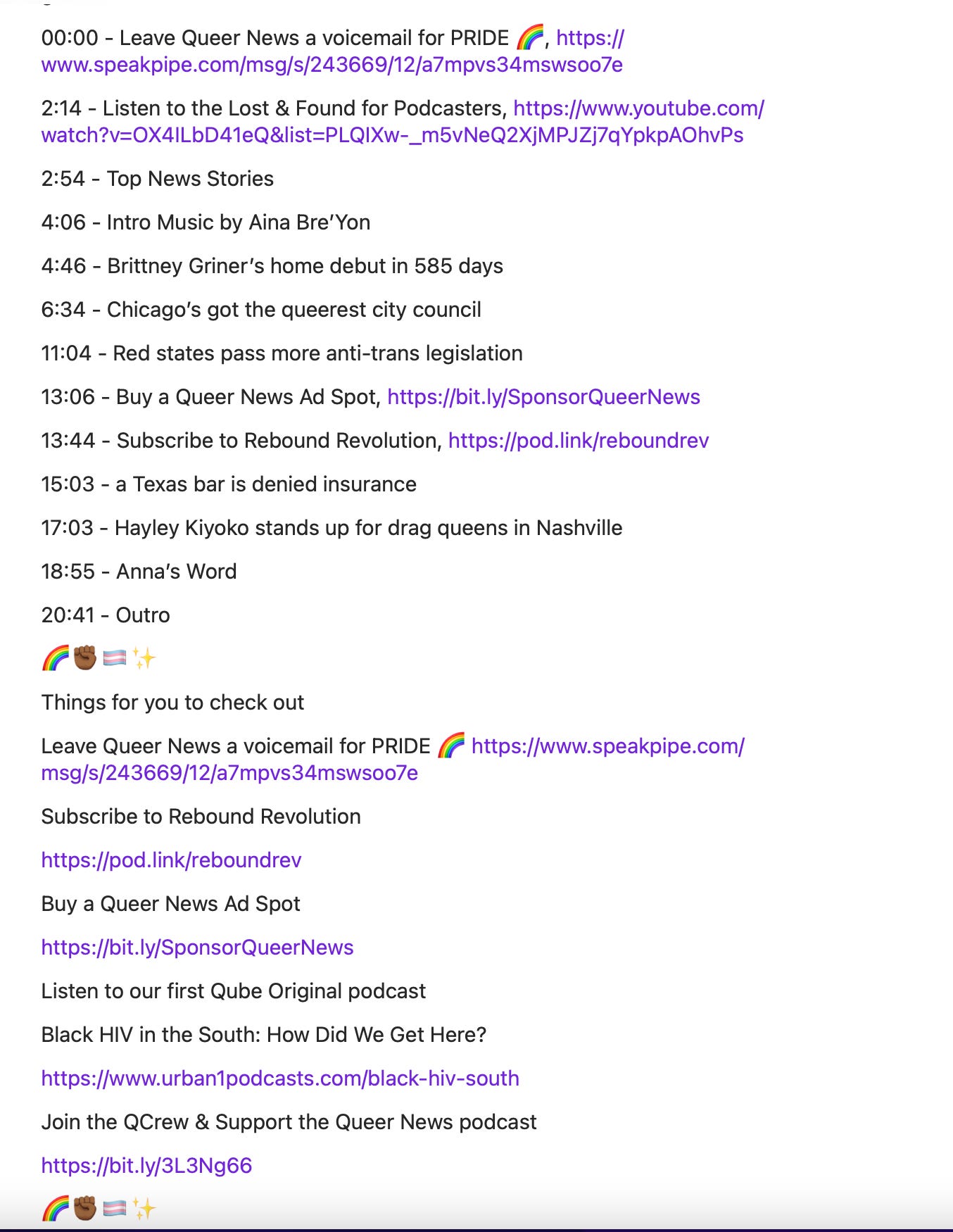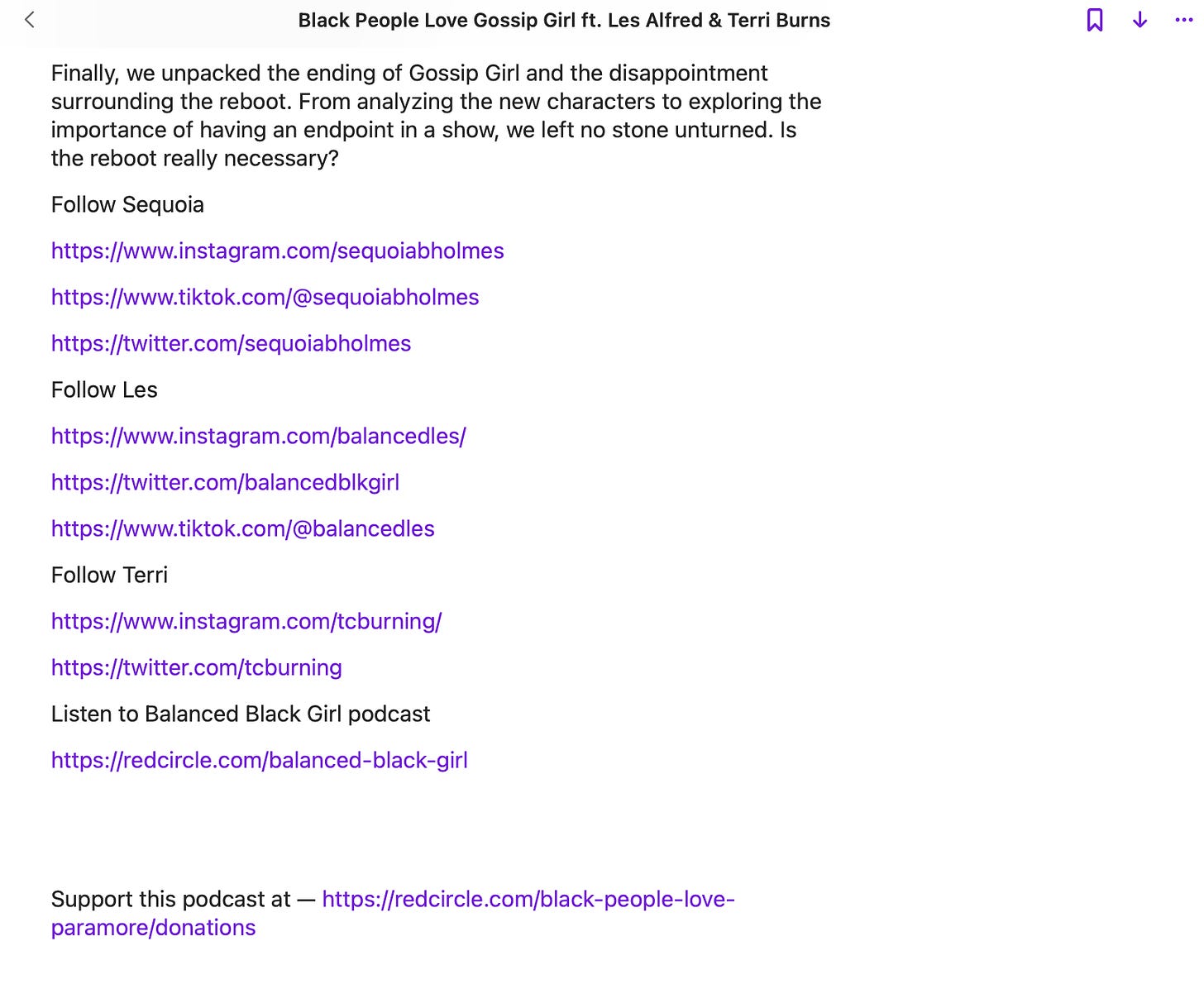Earlier this month, Tink won Quill’s Best Podcast PR Company award. We celebrated by sharing The Ten Tink Commandments on podcast marketing and PR. One of the commandments, from fellow Tinkerer Faybeon Mickens, was:
Thou shalt add links to your metadata AND maybe a few hidden gems for those that want to learn more about your topic. Use the metadata to your advantage!
This made quite an impact; we heard from a few readers that they’d love to hear more on metadata.
So, obviously, Fay being the awesome human she is, wrote about why metadata matters, how you can use it to your advantage, and some podcasts that do it well.
But, first…
🦄 52 Weeks of Podcast Growth
It’s time to get your highlighters out and head to your calendars. On the calendar where you track your release, add 30 minutes to: 1) Share episode to social media and 2) Share episode to the podcasting Discord.
Listen, I am fully of the “if it’s not on my calendar, it’s not real” camp. So, let’s get your promotions on your calendar. This will make it seem less daunting and more like a simple to-do that needs to be checked off.
To sum it up, the last five podcast growth tips are:
Link to your podcast in your email signature.
Send a pitch to two podcasters.
Check your website for maintenance.
Transcribe a new or old episode of your podcast.
Add two promotional to-dos to your calendar: 1) share episode on social media, and 2) share episode to the podcasting Discord.
New here? Start at the beginning.
Now, without further ado.
🔭 Let’s get meta about podcast metadata
This post has been edited for clarity and brevity.
🎶 It began with liner notes
When I was younger, I had a CD subscription with Columbia House; I could get 10-12 CDs for a penny! Back then, this was gold. I could skip unnecessary trips to Sam Goody or Papa Jazz Records, and avoid having to scour over the crumbs of CDs that were already 2-3 weeks detoured from their release dates—but had finally magically avoided being shipped to Charlotte or Atlanta and made its way to Columbia, SC. Plus, I could have the latest releases right at my doorstep.
One of my favorite things to do on Saturday mornings was to blast my CD player and read the liner notes for each. I wanted to know the story behind the songs.
One of my favorite things to do on Saturday mornings was to blast my CD player and read the liner notes for each. I’d play a song and pause it at various points in the record to see the story behind each track. My eager fingers would rush from the pause button to the pages of the liner notes in hopes to magnify the tiny text line by line. I wanted to know the story behind the songs; I wanted nerd fodder for band rehearsals or basketball practices.
As an adult, I look back at my jovial curiosity as a gateway to how I enjoy art today. Liner notes were pretty much the metadata of the 90s!
💟 And it carried over to podcasts
Today, I find myself doing the exact same thing when I listen to my podcasts. And just like when I would follow line by line on those cd liner notes, I’ve discovered that I do the same thing with podcast metadata.
I love when podcast hosts take the time to add additional information in their metadata such as support facts, playlists and links to external supplemental information.
As a listener, it’s easy for me to say how much I enjoy this. But, for the podcast host/creator, I do recognize the amount of time it takes to add those details.
However, there is no one size fit all for metadata. It’s truly up to each host to decide what works best for them.
You can use metadata to your advantage in a few different ways. Here are a few examples to consider:
As a general episode summary (see below: Mind Set Win)
For supplemental information like timestamps and credits. (see below: Is My Child a Monster)
For links and references galore (see below: Queer News)
To follow the host, check out another show, and join the community (see below: Black People Love Paramore)
Bonus: to simple have fun (see below: The Ten News)
I hope these examples help with how you view metadata.
📈 Here are a few metadata optimization tips to help you get set up and ready:
Consider changing your cover art. An eye catching cover during release week can be a fun way to alert that a new episode has arrived. See more on how this, and other elements of the metadata can improve your podcast here.
Be sure to use keywords that will help your show to populate in your proper category and update your metadata via RSS feed. (Don’t leave any blanks- fill out these categories at the minimum). It’s not just me, Apple Podcasts agrees.
Write your metadata for humans, not robots/the algorithm. Learn how to do this, and keep optimizing it here.
Thank you, Fay! You can connect with her on LinkedIn to learn more podcast growth tips.
Pssst… Podcast Marketing Magic will always be free to read, but we are starting to accept sponsorships. If you or anyone you know would be interested in that, write to shreya@tinkmedia.co for our sponsorship rates!
From the desk of Tink
Preconceived examines the preconceptions that shape how we view the world and challenges the paradigms by which we live our lives. Episodes cover a diverse range of themes, including relationships, politics, medicine, philosophy and other aspects of society and culture. If you’ve ever felt like you’re going through the motions, and that your major life choices are simply subscribing to the status quo and wonder how those opinions became so ingrained in society, you’ll love the discussions on Preconceived.
More Magic
🪄 Check out Recordical’s Meet the Creators Report featuring insights into the world of independent audio creators.
🪄 For your queue: 12 of the Best Queer Podcasts to Listen to During Pride.
🪄 There are still available seats for Lauren’s Podcast Marketing Radio Bootcamp class on June 5th.
🪄Read Lauren’s piece The dos and don'ts of podcast trailers from Descript




